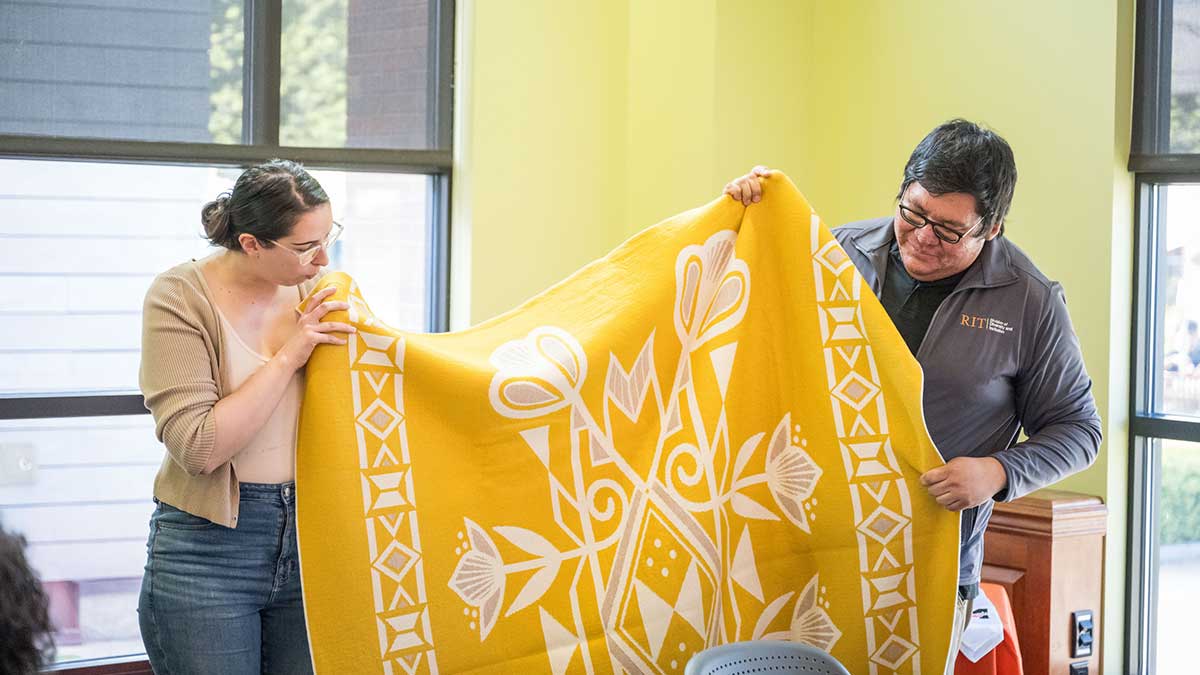Future Stewards Program
- RIT/
- Access, Engagement, and Success/
- About/
- Departments and Programs/
- Future Stewards Program
Questions?
Director, Future Stewards Program
krsddi@rit.edu
The Future Stewards Program (FSP) was established as a result of RIT’s commitment to increase the success rate and number of Native scholars (Native American, Alaska Native, Native Hawaiian and First Nations) in science, technology, engineering, and math (STEM) along with other areas of need in Indian country. We partner with students and Tribal Nations, organizations, and corporations to create opportunities for Native scholars to develop professionally, personally, and culturally.
While the Future Stewards Program was originally created to support Native American, Alaska Native, Native Hawaiian, and First Nations students, the program is open to all eligible RIT students who are interested in supporting and engaging with Indigenous communities in meaningful ways.
FSP’s mission is to:
- Recruit. Bring Native scholars to RIT, easing their transition to a campus environment.
- Retain. Support and ensure the academic, social, and professional success of Native scholars.
- Return. Keep Native scholars within the tribal community when they graduate.
- Rebuild. Rebuild our Native communities by maintaining a reciprocal relationship with our sovereign Tribal Nations.
Student Leadership
American Indian Science & Engineering Society (AISES)
The mission of the American Indian Science & Engineering Society (AISES) is to substantially increase the representation of American Indian and Alaskan Natives in engineering, science, and other related technology disciplines. The AISES membership fee for eligible students majoring in science, technology, engineering, or math fields is sponsored by the RIT Future Stewards Program at their request. AISES meets monthly and each year RIT sends a large delegation of scholars to the AISES National Convention. RIT covers all travel expenses for those presenting research. Students have found the national conference an excellent opportunity to network, present their research and secure co-ops.
For more information, email aises@rit.edu
Hawaiian Culture Club
The Hawaiian Cultural Club at RIT is dedicated to fostering a deeper understanding and appreciation of Hawaiian culture, history, and traditions among our members and the wider community. We strive to promote awareness and respect for Hawai‘i’s unique customs and values and provide opportunities for members to learn and participate in cultural activities such as hula, language, music, and arts. Through our events and outreach, we aim to embody the spirit of aloha and build a welcoming, inclusive community.
For more information, email hcc@rit.edu
Native American Students Association (NASA)
The Native American Student Association (NASA) is open to all members of the RIT community who are interested in Native American, Alaska Native, and First Nation issues and culture. NASA is primarily a social club and meets monthly. Membership is free and is a good way to meet fellow Native scholars. Annual events attended by NASA include an overnight stay in the long house at the Ganondagan State Historic Site and help plan Native American Heritage Month (NAHM) and the NAHM kickoff event.
For more information, email: ritnasa@rit.edu
Academics
The immersion in Native American and Indigenous studies enhances students’ knowledge of the unique heritage of Native Americans and Indigenous peoples and their relationships with people from other communities and nations. This enhanced understanding is grounded in the study of the histories, collective memories, cultures, and languages of Native American and Indigenous peoples, and the representations, stereotypes, and pertinent laws and policies governing their lives. Immersion courses emphasize Indigenous ways of knowing and learning in the past and present in the Americas and across the globe.
Learn more about the immersion in Native American and Indigenous studies
Outreach Day
Native American Outreach Day (NAOD) is a one-day event that brings Native high school and junior high students to RIT’s campus. Typically held each year in April, participants are invited to explore RIT through an Indigenous lens and learn what programs and support are offered to them on and off campus. The goal of outreach day is to increase the Indigneous student enrollment at four-year institutions by highlighting the services and opportunities for success in college while keeping ties to their individual heritage.
Native American Outreach day will be hosted in April 2026.
Partnerships and Projects
Native American Advisory Council (NAAC)
On June 7, 2010, RIT held the inaugural meeting of President Destler’s Native American Advisory Council, which included members of the Haudenosaunee Grand Council. Its ongoing purpose is to foster a tribal government-university relationship providing RIT senior administrators with a necessary connection to the Tribal community so that we can make higher education more attractive, provide the proper support system to keep current Native scholars successful, and assist in the return of Native scholars to the Tribal community.
The Future Stewards Program facilitates the strategic partnership between RIT and Native American, Alaska Native and First Nation Governments and communities for the purpose of providing directed educational and experiential programs for Native American, Alaska Native and First Nation scholars.
We invite Tribal communities to send their best and brightest students (Future Stewards) to learn the latest science and technology and self-determined skills needed by Tribal communities while applying traditional values, methods, and knowledge. RIT seeks to build lasting and productive partnerships with Tribal communities based upon mutual respect and reciprocity. It is expected that these relationships will facilitate synergetic relationships whereby Tribal communities consider hiring RIT graduates and graduates consider working for Tribes.
Indigenous Arts & Sciences Coalition at Ganondagan
As a result of the commitment to preserve Indigenous Knowledge, RIT, Ganondagan State Historic Site and Friends of Ganondagan have signed a Memorandum of Understanding forming the Indigenous Arts and Sciences Coalition.
Through this relationship RIT is able to conduct field research at Ganondagan. Future Steward Scholars have the opportunity to become involved with research projects related to controlling invasive plant species and restoring native grass seed.
Iroquois White Corn Project at Ganondagan
RIT worked with community partners to help re-establish the Iroquois White Corn Project at Ganondagan State Historic Site. The Iroquois White Corn Project grows, processes, and sells our heirloom corn and creates programs for nutrition, community, and education in order to support Ganondagan, the Haudenosaunee (Six Nations), and the friends of both. White corn was farmed by the Iroquois for more than 11,000 years, but was abandoned by the Europeans who settled in the “new world” in favor of sweet corn. Today, less than a total of 75 acres of land are dedicated worldwide to the growth of white corn.
Seneca Language Revitalization
Combining linguistics with computer science, the Seneca Language Revitalization Project works to enhance usability of the Seneca language through a series of educational programs that will build capacity among Tribal members. The core component of the project is a comprehensive, web-based, interactive Seneca language dictionary and reference guide.
Land Acknowledgment
We acknowledge that the land on which we gather is the traditional territory of the Onöndowa’ga:’, the people of the Great Hill. In English, they are known as Seneca people, the keepers of the Western Door. Together with the Mohawk, Oneida, Onondaga, Cayuga, and Tuscarora Nations, the Seneca are part of the sovereign Haudenosaunee Confederacy. We honor and respect the enduring relationship that exists between these nations and this land.
Land Acknowledgement Video
RIT community, please use the link below to download the official RIT Land Acknowledgement video to be utilized during your events and programs.



